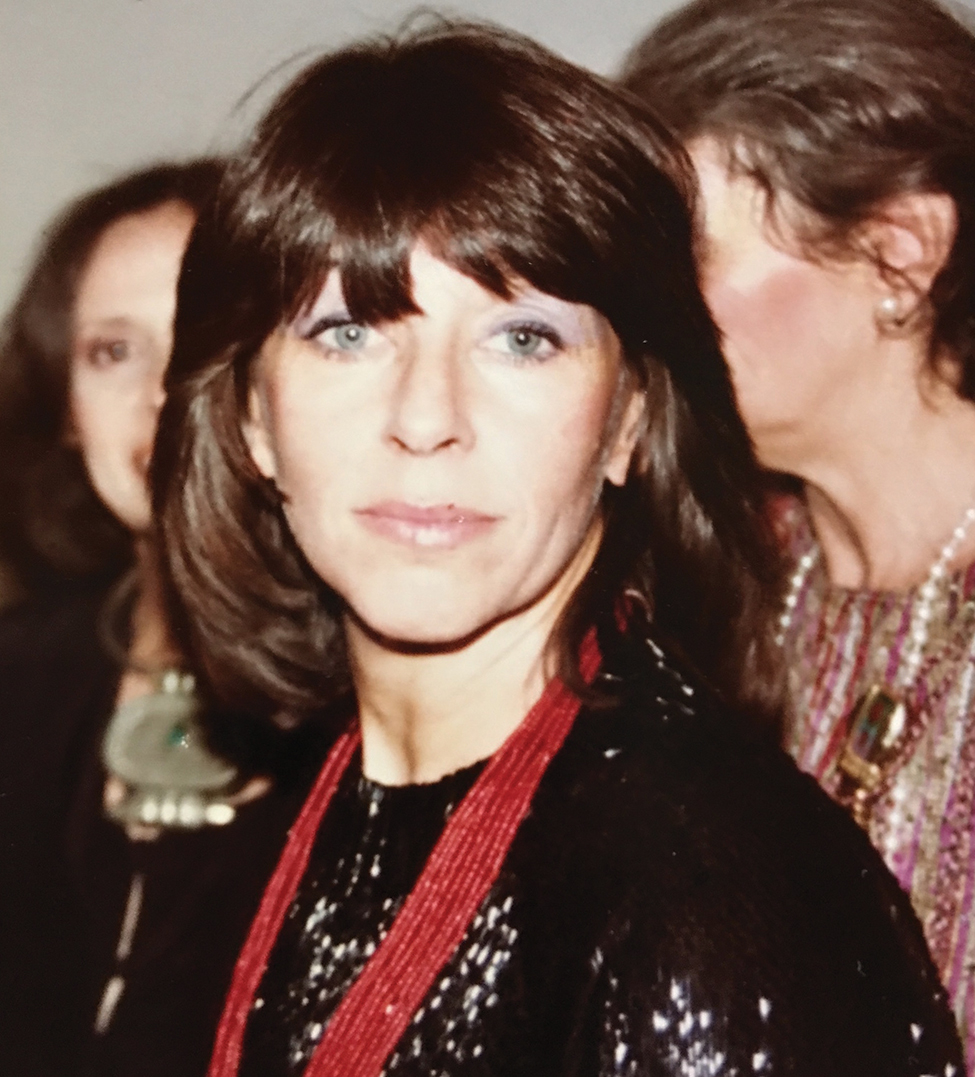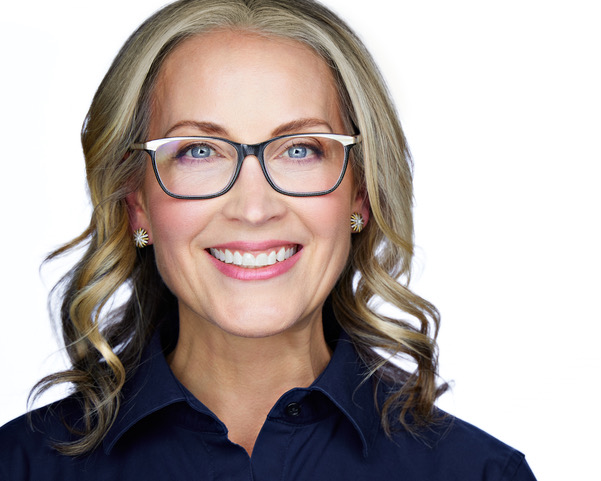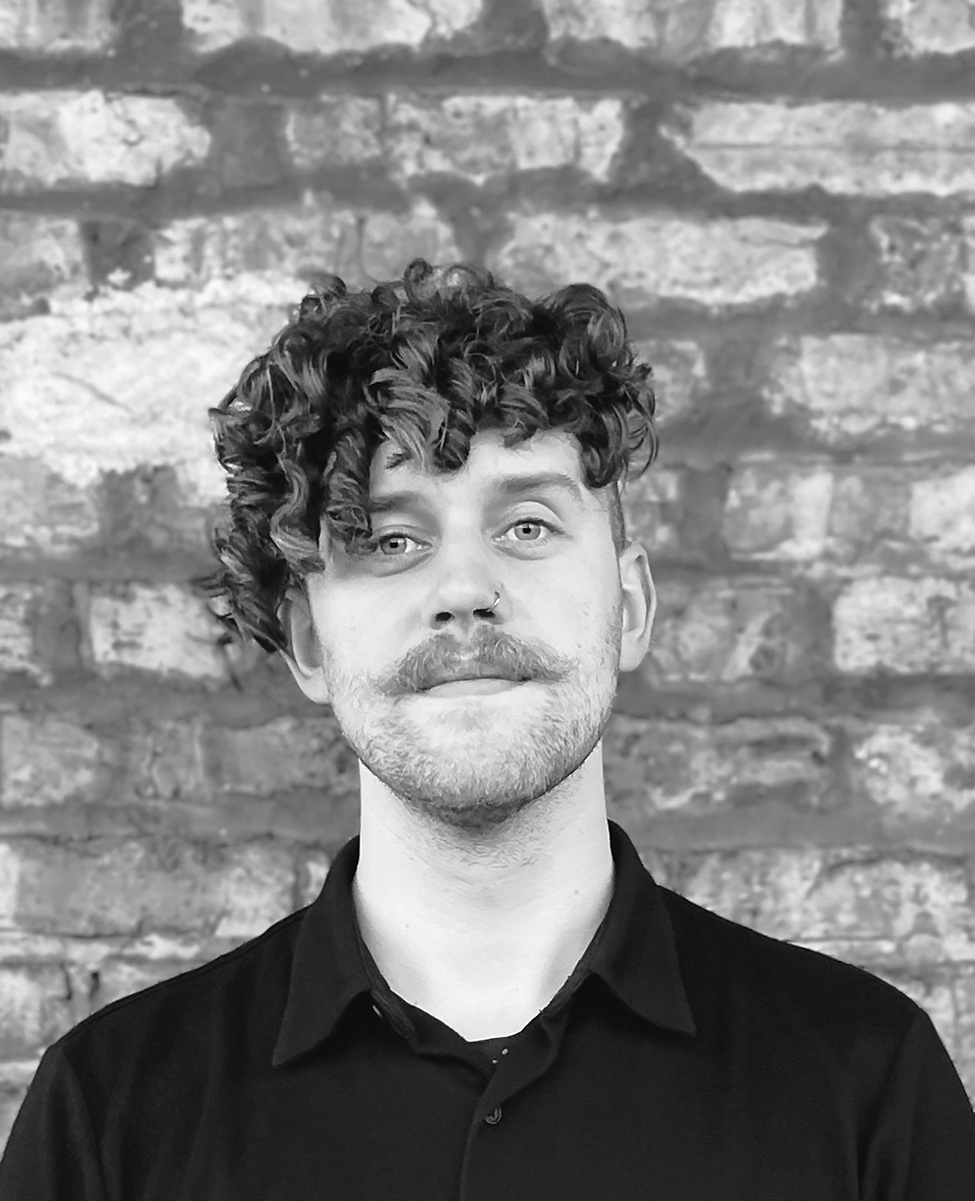Tony Fitzpatrick's Second Act
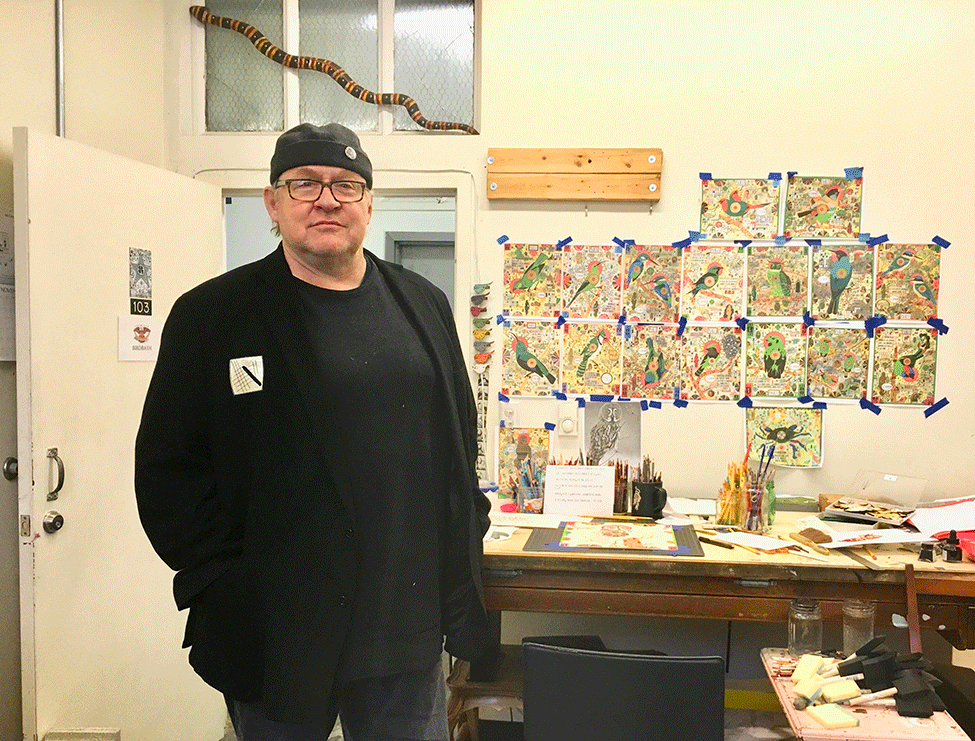
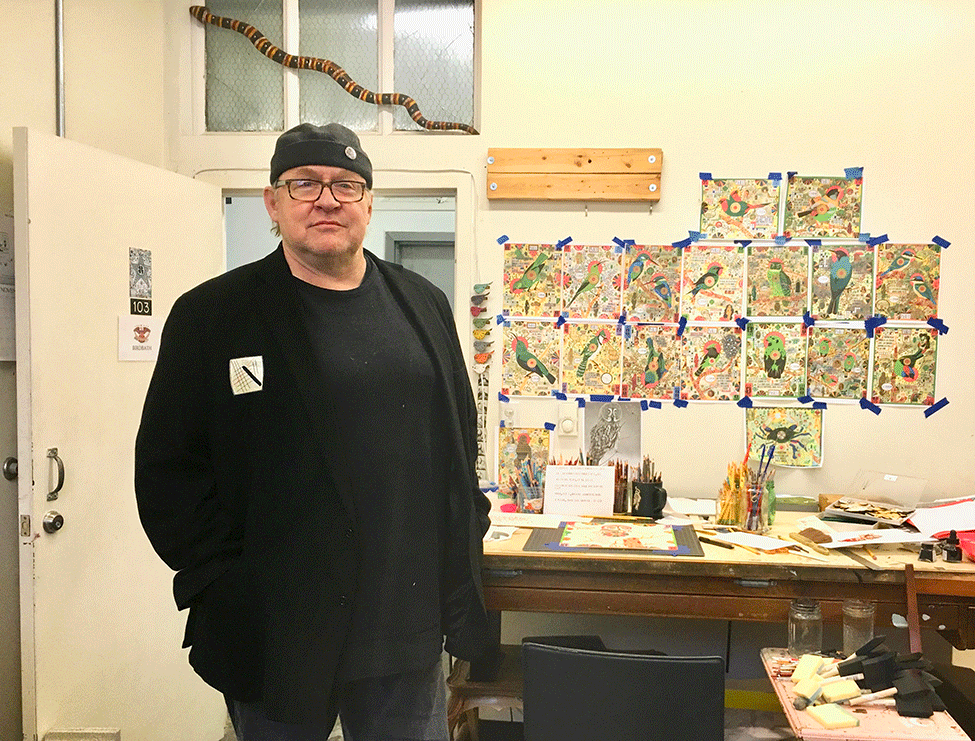
By GINNY VAN ALYEA
I’ve known artist Tony Fitzpatrick for about 10 years, and I usually see him in person to catch up over lunch somewhere or while taking a break at his studio on Western Ave.
Recently my husband and I watched Tony on screen, where he portrays a formidable, brooding character, Jack Birdbath, who opens a surprising first scene of season 2 of Patriot, a quirky crime series on Amazon Prime. I know it is Tony in the scene before I even see him, because I can hear his low, tough guy voice struggling to explain a request to a French bank teller. In English he emphasizes that he needs a bunch of dimes. For what exactly, we find out soon enough.
When I next saw Tony off screen, he explained to me that in his real (past) life, he had some first hand experience using dimes to defend himself, back when he had first had a gallery 30 years ago, called World Tattoo, in a dodgy area around 13th and Wabash in Chicago.
After more than 30 years of making art, acting, and weathering a number of personal and professional challenges, at 60 years old Fitzpatrick says he is now blessed with a second act, and in part he has the City of Paris to thank for the gift of a new view and for the freedom to let things go.
His current exhibition, The Absinthe Birds, on view at The Dime, an artist incubator space Fitzpatrick founded, features vivid collages of birds threaded with poetry and inspired by the sights, history, and influences of Paris. The pulsating and hallucinogenic green from the show's title also is reminiscent of Chicago's own river at a certain time of year. While Fitzpatrick's roots are always in Chicago, his mind and soul took flight in his temporary Parisian home for a few months.
Following is an edited transcript of our conversation from late 2018.
Ginny Van Alyea: Were the dimes [in Patriot] your idea, or was that just the script?
Tony Fitzpatrick: Well, I was carrying hard objects around in a tube sock just to walk home, back when I had World Tattoo at 13th and Wabash.
GV: What was World Tattoo?
TF: It was a gallery – 6,000 square feet. And back in 1988/89, that was a pretty shit crack neighborhood. More than once would cars damn near run me over. So with the [tube] sock, I would take their fucking tail light out. Then they'd get out of the car, and I would be holding the sock and say, 'Come on.' They don't like to drive around.
GV: 30 years later it’s pretty good material on TV.
TF: I mean, I'm 60 years-old now, and I have a second act. [Patriot] has put me through almost five months in Paris. I got to take a good long look at one of the cradles of Surrealism and drink all of that in – take into my bones what the essence of that city was.
GV: What has the influence of that stay been on your art?
TF: This next body of work, The Absinthe Birds, is about love, and beauty, and sex, as well as fraudulence and failure, and the pursuit of the invisible.
GV: The series that you're working on for 2019 – are those the works on the wall in your studio?
TF: Those are for my book that will be out in May.
The show [here at the Dime] opened on December 7 and features 20 of the 24 pieces that will be in the book. The poems are written in English, but what we're doing is working with somebody from Orleans, France to make sure that they flow in French.
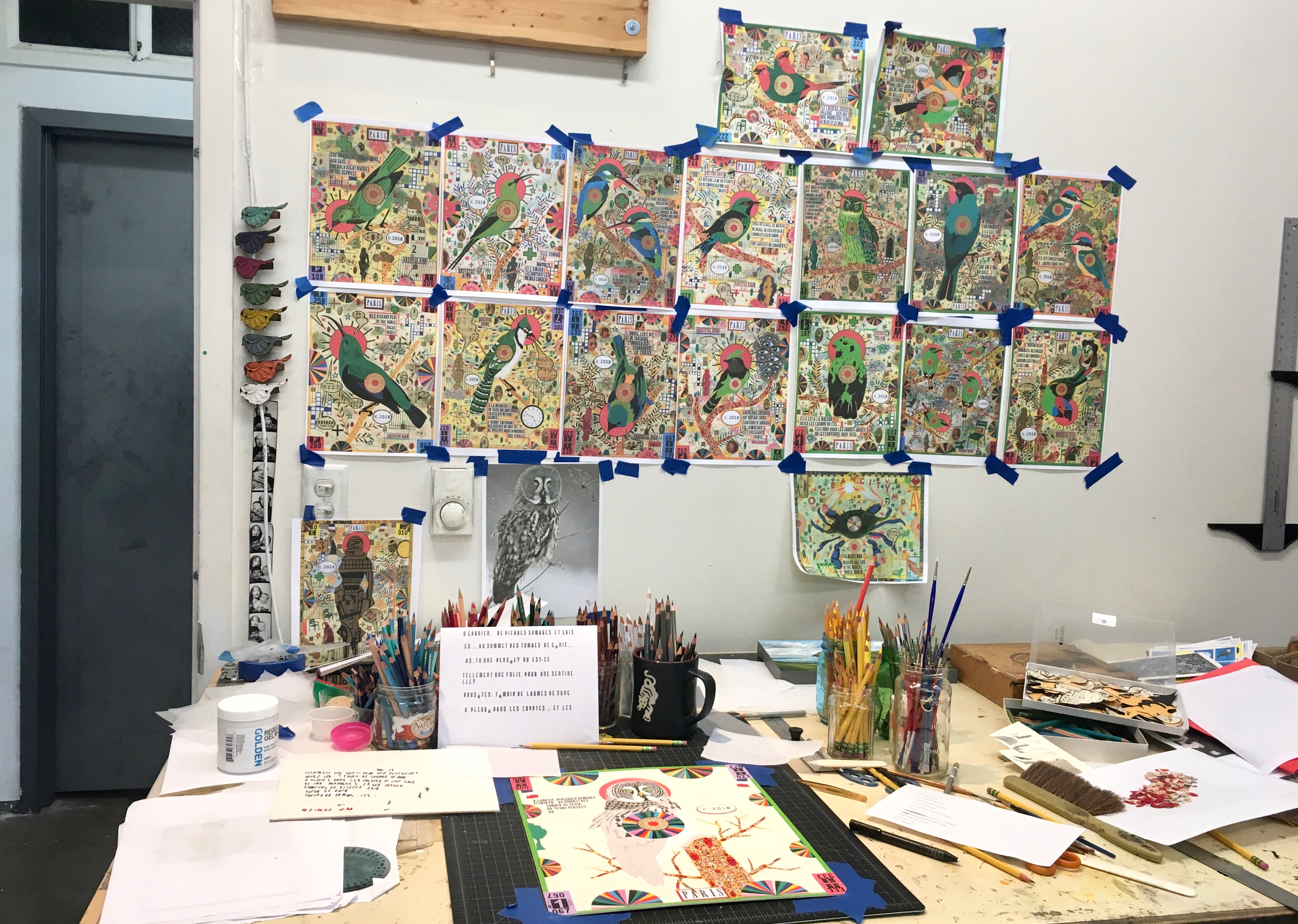
GV: I was just going to ask if you happened to be fluent in French.
TF: I’m not. One of the hardest parts is making sure that everything reads right for sentences in French. When this show goes to Paris, I want the people of Paris to know, ‘I made this show for you. I love your city. It breathed new life in me as an artist.’
GV: Your time in Paris affected you personally.
TF: It got me away from Donald Trump's America for four silent months. I was able to shut out the noise, and that's been a big challenge for me – shutting out the grind and the filth of the absolute corrupt soul of what he has inculcated in this country. What he has awoken.
GV: It's happening here, whether you’re at home or abroad. What was different about being in Paris?
TF: I think I was able to take a very long view of how the way we live affects the rest of the world, and how frightening it is for other countries to see that this is a monkey driving a spaceship. This is a shaved ape. It's like they went to the zoo, found an albino gorilla, and they shaved it. Judging by what he says, they did not shave the smartest gorilla.
GV: Were you in the left bank or right bank in Paris?
TF: I was in the [The Place de la] République, right by Marianne, in the gut at the center of Paris. It's like being a poker player. You get to see the whole board – everybody you're playing with. I was amazed at the absolute participatory activism there was in Paris.
GV: How did you find time in Paris to do your art at the same time you were filming for four months?
TF: I did the ink work on a lot of [my collages]. Each one starts with a drawing.
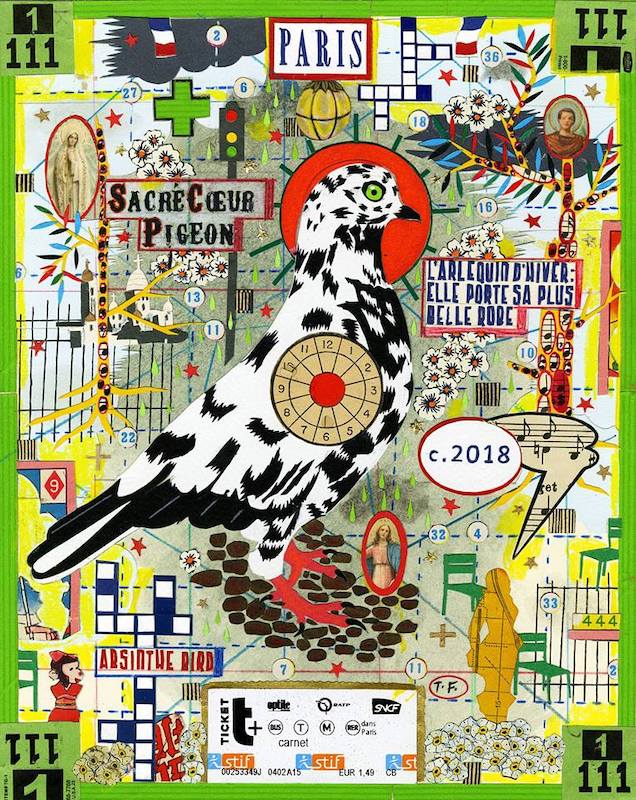
GV: Were you creating pieces there?
TF: I had to do a lot of them in my room. I put more fucking ink stains on that carpet over there.
But you know what? They love me. So I would say to the guy from housekeeping, ‘I fucked up. I dropped a spot of ink again. Here is a little etching. I'm so sorry.’
The hotel framed up my etchings and put them in the lobby.
GV: What was your day to day when you were there?
TF: Work. We would go to set – it was all over Paris.
We spent a couple of days shooting in Luxembourg Gardens, which I absolutely fell in love with. It's kind of a birder's paradise. A couple of times they had to come and get me. I’d wander off and be on a fucking nature walk. I saw kingfishers. I saw herons. I saw lapwings, which I've never seen. They're not over in America much. Plovers. Just incredible.
GV: So it was a real refresh for you personally to go and be immersed in something else for so long.
TF: When we came home, we'd also moved to a new house in East Humboldt Park. In fact, when we got to the airport, we had to call [my wife] Michelle and figure out where the hell we lived.
So, yeah it was a refresh. It was nice.
GV: What has changed for your artistic practice?
TF: It also gave me some real perspective about going forward with my visual art career. I don't have to do anything I don't want to do anymore.
I knew the night The Secret Birds opened at the De Paul Art Museum [in 2016] something would change. I looked around and my mom was so glad she was there. I thought to myself, ‘This is the last time this is ever going to happen. My mom got to see a big museum show. After this, I don't ever have to do this again.’
Then I thought that way about doing gallery exhibitions too.
What I'm really interested in now is making the work that I absolutely have to make and want to make. I don't give a fiddler's fuck if anybody buys it or not. I couldn't care less. But thankfully they do [buy it].
GV: You’ve been doing more here at The Dime.
TF: What we're building here, this room, it's kind of magical. It's not fancy. We have clamp lights. There's really no money to make this thing fancy, but people can come in here and they can look at art.
Artists can sell art and they don't give up a dime, you know? This is an incubator. What we're building here isn't an art gallery. We're building a community. I keep telling all the other artists who show here, ‘The best asset that you have in the world is each other. Join together and support each other; act like a community and ignore the bullshit.’
GV: Now there’s Jack Birdbath's scene with the dimes in Patriot, and here we are sitting in Chicago in The Dime. I've never asked where the name for this space came from.
TF: It's an old circus trick. A Dime Museum – which was the original name, we thought – was where you paid at the circus to see the lady with the beard, or the seal boy, or the [vaudeville]. The freaks.
GV: This is the freak show?
TF: Not exactly. This was never supposed to be an open gallery. This was ...
GV: Not really planned.
TF: No. Not really. But we've given lots of artists their first show. It’s what I want to do.
GV: You've tried to let go of a lot of things you used to worry about having to do.
TF: You bet.
Whenever I get an email or a query from an institution in an email, I don't even read that email. I just delete it.
People who want to know where to find me? I don't give a shit.
GV: It's interesting. You've had a long –
TF: Career of being an asshole? Yeah!
GV: I was going to say acting career. You've been on screen and on stage quite a bit. With two seasons of Patriot done, are you going to try to keep balancing film and art?
TF: Patriot didn't stop me from making art. I just figured, ‘Okay, this is what’s going on now.’ My assistant Yulia [Kuznetsova] was here [at the studio] while I was away. When I came home, I had a bunch of works on paper started, and a lot of them became the Absinthe Birds. I just kept moving, you know? In large part we can also do that because my work's portable.
GV: I'm still picturing ink on the carpet and how you and Max hauled up all of your crap up the Metro stairs. Did you just bring cases of paper, and materials, and ink?
TF: I just did a lot of drawing – the paper and stuff I found there. Also, I found out half of the members of our [film] crew were artists. They pointed me around to stuff. There are good art supply stores of course. Plus I did some garbage digging. I’m sure they said, ‘Who's that large man digging through the French garbage? Why, that's Tony.’
GV: Did you get a sense of what the art scene is like in Paris?
TF: Pretty cool. Street art is huge. I met a bunch of those people. We will get some of them here next year. Our show [at The Dime] on the 9th of February is an amazing husband and wife team: a Brazilian guy, Caetano Azevedo, who has lived in Paris for the last 30 years, and his wife Liza Moura, who's a French photographer. Together they have been following the refugee encampments in Paris.
GV: Back to Patriot, I want to know more about the evolution of Jack Birdbath. You came up with the idea for the dimes in season two. Did you have more to do with his dialogue and character?
TF: I think Steven Conrad obviously wrote the character with me in mind.
We shot the pilot in 2015. When we went to series, when I saw the writing on the scripts for season one, I went, ‘Oh shit. They're not going to let me do this. They're going to give this to named actor.’ I knew it was a really good part. Those guys hung in there and dug in for me and said, ‘You are who we want to do it.’
Everyone in the cast – Gil Bellows, Terry O'Quinn, Debra Winger, Mike Dorman, Michael Chernus – they're all so goddamn good. I mean I've always been a lousy employee. But I skip to work every day for Patriot. I couldn't wait to get there. I couldn't wait to be part of that mix.
It was joyful, you know?
Well, it's Paris. There isn't a goddamn thing wrong with Paris. I really fucking loved Paris.
